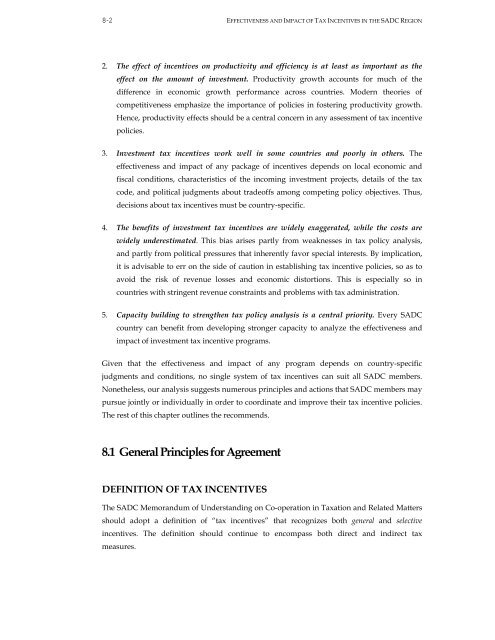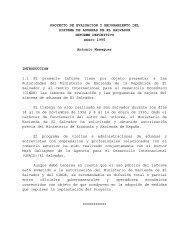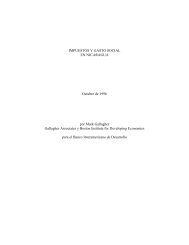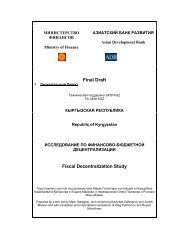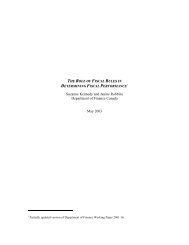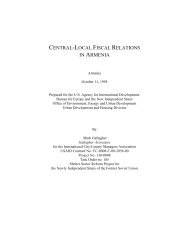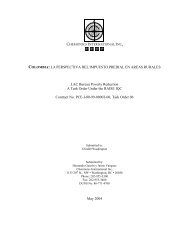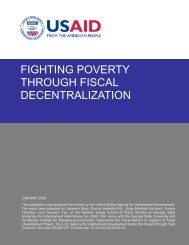Effectiveness and Economic Impact of Tax Incentives in the SADC ...
Effectiveness and Economic Impact of Tax Incentives in the SADC ...
Effectiveness and Economic Impact of Tax Incentives in the SADC ...
You also want an ePaper? Increase the reach of your titles
YUMPU automatically turns print PDFs into web optimized ePapers that Google loves.
8-2 EFFECTIVENESS AND IMPACT OF TAX INCENTIVES IN THE <strong>SADC</strong> REGION<br />
2. The effect <strong>of</strong> <strong>in</strong>centives on productivity <strong>and</strong> efficiency is at least as important as <strong>the</strong><br />
effect on <strong>the</strong> amount <strong>of</strong> <strong>in</strong>vestment. Productivity growth accounts for much <strong>of</strong> <strong>the</strong><br />
difference <strong>in</strong> economic growth performance across countries. Modern <strong>the</strong>ories <strong>of</strong><br />
competitiveness emphasize <strong>the</strong> importance <strong>of</strong> policies <strong>in</strong> foster<strong>in</strong>g productivity growth.<br />
Hence, productivity effects should be a central concern <strong>in</strong> any assessment <strong>of</strong> tax <strong>in</strong>centive<br />
policies.<br />
3. Investment tax <strong>in</strong>centives work well <strong>in</strong> some countries <strong>and</strong> poorly <strong>in</strong> o<strong>the</strong>rs. The<br />
effectiveness <strong>and</strong> impact <strong>of</strong> any package <strong>of</strong> <strong>in</strong>centives depends on local economic <strong>and</strong><br />
fiscal conditions, characteristics <strong>of</strong> <strong>the</strong> <strong>in</strong>com<strong>in</strong>g <strong>in</strong>vestment projects, details <strong>of</strong> <strong>the</strong> tax<br />
code, <strong>and</strong> political judgments about trade<strong>of</strong>fs among compet<strong>in</strong>g policy objectives. Thus,<br />
decisions about tax <strong>in</strong>centives must be country-specific.<br />
4. The benefits <strong>of</strong> <strong>in</strong>vestment tax <strong>in</strong>centives are widely exaggerated, while <strong>the</strong> costs are<br />
widely underestimated. This bias arises partly from weaknesses <strong>in</strong> tax policy analysis,<br />
<strong>and</strong> partly from political pressures that <strong>in</strong>herently favor special <strong>in</strong>terests. By implication,<br />
it is advisable to err on <strong>the</strong> side <strong>of</strong> caution <strong>in</strong> establish<strong>in</strong>g tax <strong>in</strong>centive policies, so as to<br />
avoid <strong>the</strong> risk <strong>of</strong> revenue losses <strong>and</strong> economic distortions. This is especially so <strong>in</strong><br />
countries with str<strong>in</strong>gent revenue constra<strong>in</strong>ts <strong>and</strong> problems with tax adm<strong>in</strong>istration.<br />
5. Capacity build<strong>in</strong>g to streng<strong>the</strong>n tax policy analysis is a central priority. Every <strong>SADC</strong><br />
country can benefit from develop<strong>in</strong>g stronger capacity to analyze <strong>the</strong> effectiveness <strong>and</strong><br />
impact <strong>of</strong> <strong>in</strong>vestment tax <strong>in</strong>centive programs.<br />
Given that <strong>the</strong> effectiveness <strong>and</strong> impact <strong>of</strong> any program depends on country-specific<br />
judgments <strong>and</strong> conditions, no s<strong>in</strong>gle system <strong>of</strong> tax <strong>in</strong>centives can suit all <strong>SADC</strong> members.<br />
None<strong>the</strong>less, our analysis suggests numerous pr<strong>in</strong>ciples <strong>and</strong> actions that <strong>SADC</strong> members may<br />
pursue jo<strong>in</strong>tly or <strong>in</strong>dividually <strong>in</strong> order to coord<strong>in</strong>ate <strong>and</strong> improve <strong>the</strong>ir tax <strong>in</strong>centive policies.<br />
The rest <strong>of</strong> this chapter outl<strong>in</strong>es <strong>the</strong> recommends.<br />
8.1 General Pr<strong>in</strong>ciples for Agreement<br />
DEFINITION OF TAX INCENTIVES<br />
The <strong>SADC</strong> Memor<strong>and</strong>um <strong>of</strong> Underst<strong>and</strong><strong>in</strong>g on Co-operation <strong>in</strong> <strong>Tax</strong>ation <strong>and</strong> Related Matters<br />
should adopt a def<strong>in</strong>ition <strong>of</strong> “tax <strong>in</strong>centives” that recognizes both general <strong>and</strong> selective<br />
<strong>in</strong>centives. The def<strong>in</strong>ition should cont<strong>in</strong>ue to encompass both direct <strong>and</strong> <strong>in</strong>direct tax<br />
measures.


